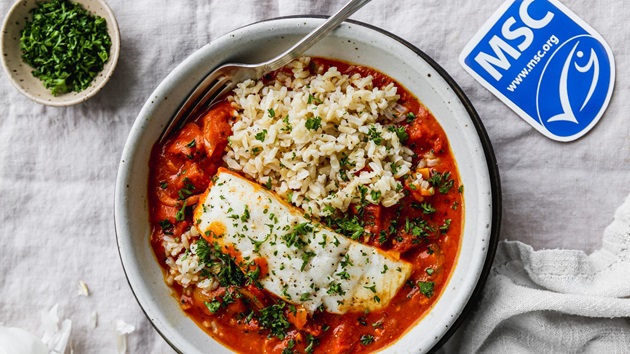There’s no question that our lives have changed drastically over the past 2 years. Living through a global pandemic, witnessing the effects of climate change, and experiencing daily uncertainties has unfortunately caused burnout and overwhelm to affect us all.
On a more positive note – as a dietitian, I’ve seen some healthy changes in the way we view food and nutrition as a result of these global experiences!
For one, there appears to be an increased interest in foods that support our overall well-being, such as brain health, mental health, and healthy aging. At the same time, I’m seeing an increased desire to reduce our impact on the environment.
Are you looking to support your brain, mental health, and the planet through your food choices? If so, there is increasingly encouraging research focused on the role that seafood appears to play in all these areas.

Why is Seafood Considered "Brain Food"?
Approximately 20% of the dry weight of the brain is made up of polyunsaturated fatty acids, including an omega-3 fatty acid called docosahexaenoic acid (DHA) that seafood contains in impressive amounts.
DHA is a major structural component of the cell membranes of our brain and helps to support normal and healthy brain function. Omega-3s like DHA are essential to consume through food (or supplements) because our bodies need them but can’t produce them on their own.
Seafood happens to be one of the best sources of DHA! Oily fish, like anchovies, mackerel, herring, salmon, and sardines are particularly rich in this type of omega-3 fatty acid.
Because of this, the 2020-2025 Dietary Guidelines for Americans recommend that individuals of all ages consume at least 8 ounces of seafood per week. For many people, that may look like a standard 4-ounce serving of fish twice weekly. Most health organizations mirror this, suggesting an average intake of 250-500mg of marine omega-3s per day.
Another type of omega-3 called ALA is also found in plant foods like flaxseeds and walnuts. However, to reap the full brain-boosting benefits of ALA it needs to be converted to DHA in the body, which only happens at a very low rate of about 0.2%-0.5%. Thus, if you were to consume only plant-based omega-3s (ALA), you may not be getting the amount of DHA that your brain and body need.
Can Seafood Help with Mental Health?
Because fish is a rich source of omega-3 fatty acids that play a key role in brain health, researchers have been interested in the role that regular fish consumption plays in managing common mood disorders like depression.
Dozens of studies have examined the link between fish consumption and mental health, and the results are promising. For instance, an analysis of 31 studies found that dietary omega-3 intake from fish is associated with a lower risk of depression. Similarly, another analysis of 10 studies also found that fish intake reduced the risk of depression, especially in women.
What’s more, fish is not only a source of omega-3s, but also of high-quality protein, vitamins, and minerals like vitamin D, magnesium, and zinc which may have protective effects on depression as well.
Ultimately, nutritional psychiatry is a newer area of research that offers significant potential as an additional tool for preventing and treating neuropsychiatric disorders. And seafood appears to be a key food group in an overall healthy dietary pattern to support mental health, along with other foods like vegetables, fruits, whole grains, legumes, nuts, and seeds.
Should You Eat Seafood While Pregnant?
Because DHA plays such an important role in the brain, it would make sense that it should be critical to consume during pregnancy and breastfeeding to support infant brain development.
In fact, the 2020 Dietary Guidelines Advisory Committee (DGAC) recently looked into this theory. Through their review of 44 studies, they concluded that the consumption of seafood during pregnancy is associated with improved neurocognitive development in infants as compared to eating no seafood. They found that increases in child IQs (from 7.1 to 9.5 points) were also associated with greater maternal seafood consumption.
These findings support the recommendation for pregnant and breastfeeding women to consume at least 8-12 ounces of a variety of seafood per week, from choices that are lower in mercury.
They further reinforce the need for children to consume omega-3 fatty acids to support the rapid brain development that occurs during the first 2 years of life. A helpful guide for choosing fish lower in mercury can be found here.
Can Fish Help Prevent Dementia & Alzheimer's Disease?
Just like seafood can help with brain health in infancy, it appears to play a role in our cognitive function later on in life as well.
With disorders like mild cognitive impairment, Alzheimer’s, and dementia on the rise, more and more studies are looking at the link between diet and cognitive decline. For instance, one review found that populations with a higher intake of fish had a 20% decreased risk of Alzheimer’s disease.
Similarly, a 2019 analysis found that adults 60-80 years old who consumed at least 250mg of omega-3 fatty acids per day from seafood had a reduced risk of cognitive decline, performing better on three tests of cognitive function tests of cognitive function.
Another analysis of 21 studies found that an additional 1-serving per week of fish in the diet and an additional 100mg/day increase of DHA from marine sources were both associated with lower risks of dementia and Alzheimer’s disease.
Ultimately, seafood intake appears to help keep our brains sharp as we age! These studies show that it’s never too early or too late to add seafood into our diets for brain health, mental health, and cognitive benefits all across the lifespan.
How Can I Eat More Ocean-Friendly Seafood?
If you’re worried that eating more seafood can have a detrimental effect on the planet, choosing sustainable seafood is the answer! This way, when you choose seafood that’s healthy for you, you’ll know that you’re making a choice that’s healthy for the ocean too.
When shopping for seafood, whether you’re looking in the fresh aisle, the frozen section, or for canned goods, try to look for the easy-to-identify MSC blue fish label on the packaging. This label means the seafood is certified to come from a fishery that protects both the fish population and the surrounding ecosystem ensuring they are healthy for generations to come.
To enjoy the brain-boosting benefits of fish sustainably, try to opt for different seafood varieties when possible. They each offer their own unique nutrition profile, and diversity in diet is key to good health.
Another tip is to pair seafood with plenty of vegetables, whole grains, nuts, seeds, or legumes for even more brain and mental health benefits. This could look like flaking baked salmon on a salad, adding canned sardines or tuna to a veggie-filled pasta, or cooking shrimp in a vegetable and brown rice stir-fry.
And if you’re in need of more seafood recipe inspiration, be sure to check out the latest MSC Ocean Cookbook 2022. It’s filled with recipe ideas for many different certified sustainable fish species and is a great place to get started with making sustainable seafood a regular part of your healthy cooking repertoire!


